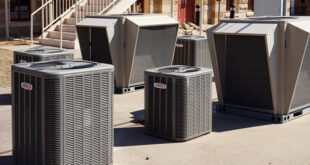
A noisy air conditioner can be annoying – and alarming. When you hear humming or other noises suddenly, you can be pretty sure there’s something wrong with the system. The type of sounds you hear can be useful to help a technician diagnose the cause of the issue. Don’t be tempted to keep the system running, as the problem could reach a point where it can no longer be fixed or repairing it is very costly because of the level of damage.
You could be lucky in that only a minor amount of work needs to be done to get it working quietly and efficiently again. While different models could encounter a range of issues, here are some of the common causes of noises in a standard window unit.
Page Contents
When the fan is noisy
Firstly, locate the source of the noise. If the fan is emitting a rattling or humming noise, it’s either loose or needs to be cleaned. You can check this by opening the air conditioner cabinet and finding the fan. Clean off any debris that is clinging to the blades or around them. It’s not uncommon for insulation or other debris to fall into the unit and set up a noise when the blades move.
Another cause of the noise could be a loose fan. Check the blades to see if they are loose and if they are you can tighten the screw at the hub with a screwdriver. Then, are the blades straight? If so, the bent blade could be hitting the inside of the unit, causing a sound. You could attempt to move it back into place gently, but it would be a good idea at this point to call in a qualified technician, so you don’t inadvertently cause more damage to the system.
Has the air conditioner been lubricated?
When you have your air conditioner system serviced and checked annually (which is recommended), the technician will apply oil in the oil ports. It applies to units that have unsealed motors. A motor that needs lubrication could emit a humming or grinding noise. Special oils are used for this. They are called refrigeration oils, and they have a low pour point and don’t freeze at low temperatures, making them suitable for use in AC units. Examples include POE oil and mineral oils.
Check for loose screws
An air conditioner unit vibrates when it’s working. This can cause screws in the panels to become loose. The mounting screws that hold the AC in place can also be loosened as the unit operates. When either of these situations occurs, there will be a rattling noise whenever the air conditioner is putting out air. A screwdriver will quickly tighten these and resolve the problem. If you can see screws are missing, but can’t find them, call in a specialist to assist and replace them if necessary.
Clogged coil fins
When coil fins become clogged with dirt, the air conditioning unit can start to make concerning noises. You can use a vacuum cleaner that has a brush attachment to get rid of any dirt or debris with ease.
Bent coil fins can also cause a humming noise. A tool called a fin comb can be used to straighten a bent coil fin. It’s quite easy to use: insert the teeth of the fin comb between the coil fins. Slide to straighten the bent fins.
These easy steps can save you time and money, but if it’s not one of these easy fixes behind the noise in your aircon, it’s best to call in your HVAC contractor or installer.
If you are using a different aircon system in your home, these are the noises to listen out for:
Loud banging. If you hear this noise coming from your outdoor unit, it could be the compressor. It is the part that’s responsible for circulating refrigerant. The parts inside the compressor can become loose and create a loud banging sound as they rattle around.
Loud buzzing. If you hear this noise near the air handler or the outdoor unit, it’s a sign that you have an electrical problem.
Loud clicking. If you hear the clicking sound while the aircon is running, it could mean there is an object hitting the fan. If you hear the clicking noise when you try to start your aircon, it could mean there is a problem with the electrics of the thermostat, compressor or capacitor.
Loud hissing. The most common cause of this sound is a refrigerant leak. The copper lines and coils that carry the refrigerant can form leaks over time. When it escapes, it makes a hissing noise.
Loud screeching/squealing. This could sound like metal grinding on metal or a strange squealing sound. This could indicate a bad compressor or outdoor fan motor or a faulty blower motor.
 A Very Cozy Home Home Decor Tips and Ideas
A Very Cozy Home Home Decor Tips and Ideas 